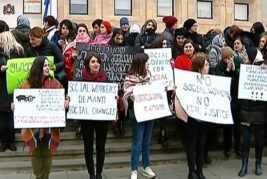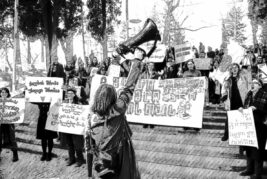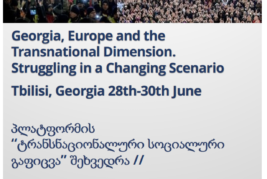organized by: Precarious dis-connections (Italy), Berlin migrant strikers (Germany), Syrena collective (Poland), No One is Illegal (Germany), Rome Social Strike Laboratory (Italy)
The starting point of the workshop has been the necessity of a common frame for understanding the current relation between mobility, austerity and precarity. This common frame is so much necessary as much the living and working conditions of external and internal migrants in Europe are widely different. Inputs provided a clear picture of this complexity, starting from Poland (the headquarter of Frontex offices, which is both a place of departure towards other European countries, and the place of arrivals of thousands people coming from East as asylum seekers and then employed in specific sectors such as construction) to Germany (where internal migrants are excluded from welfare benefits and the people recently arrived during the so-called «refugees crisis» are going to be employed in a condition worse than that of other workers, both in terms of wage and social services) to Italy (where the residence permit is granted only to those who have a labor contract, so that migrants are daily blackmailed within and outside the work-places). At the same time, different experiences of organization and struggles have been shared: from the German counseling centers, where information and support is provided for both internal and external migrants, to the massive solidarity and support in crossing borders that occurred in the last months, to the occupation of job-agencies (which manage the sans-papiers labor force) in France, and the strike of migrant labor organized in Italy on March the 1st 2010. Given this complex situation, the participants shared the idea that mobility is a crucial dynamics of present time, that recent massive movements of migrants against and across the borders show, and the EU institutions are trying to govern it according to the exigencies of labor market for lowering wages, dismantling labor and welfare rights, creating hierarchies and divisions among workers according to their legal status and undermining the very possibility of organizing against exploitation. From this point of view, migrant labor is politically central because it is a lever for producing a more general transformation of the working conditions of all. The policies enacted for governing the mobility of migrants in the last decades are now applied also to EU citizens and internal migrants who are becoming a laboratory for experimenting workfare policies. The recent border crisis between countries that are member of the Schengen area shows that migrants’ movements both towards and inside the EU are questioning the same distinction between internal and external migration. While differences exist on the basis of citizenship and status, what is clear is that we need political tools to address all these differences together, first of all through the organization of a political communication among internal and external migrant workers, and non-migrant ones. In order to do this, the people who attended the workshop agreed that it is necessary to go beyond solidarity, which is a way of supporting migrants’ struggles and movements from outside, and turn it into an organizational process. For instance, concerning the so called «refugees crisis», we have to be able to communicate that questions such housing or health do not simply concern «welcome policies», but rather the conditions of the reproduction of this massive new-come labor force, and that their management will affect everybody just in the way in which workfare policies are used to govern internal migrations.
This political understanding of mobility and migrant labor can be the base for creating the conditions for a connection of migrant and non-migrant workers towards a transnational social strike. In this perspective, we shared the necessity of defining three main claims that can be the base for shared initiatives across the borders. A European minimum wage, a European basic income and welfare system based on residence, and a European residence permit independent from labor contract and income levels. Concerning the last claim, it was recognized as a valid tool to produce common interests across different conditions, and to intervene in the political tension opened in Europe by recent migrants’ movements. The idea of a minimum duration of this visa has been considered a limit and thus discarded. Given the increasing discretional use of residency as a way to limit the access to welfare and basic services against both external and internal migrants, it was proposed to add to the claim for a European residency permit the right to residency for all. These claims can be the starting point for connecting people that are divided both through their legal statuses and their working conditions, and a tool for politicizing the choice of migration which is often an individual one. Furthermore, on the base of this shared claims, we may start processes of organization that can go beyond both the communitarian organization of different national groups and the single work-places. Lastly, these claims can be used in order to enlarge the process of the transnational strike, starting from mobility and the political centrality of migrant labor. We agreed that it is necessary to involve other groups and subject and to push for a direct involvement of unions, both the grassroots and the major ones. Finally, we agreed that the people of the workshop should remain in contact so as to deepen both the knowledge and map the different conditions of migrant labor and mobility in different countries and the communication towards further initiatives. Particularly, the necessity of involving other groups and to organize a bigger workshop on these issues in the next transnational strike-meeting was remarked, but also the possibility of working together for the organization of coordinated initiative on March the 1st, starting from the formulation of common discourses and campaigns that can foster the political communication and visibility that could pave the way for the transnational social strike.
This political understanding of mobility and migrant labor can be the base for creating the conditions for a connection of migrant and non-migrant workers towards a transnational social strike. In this perspective, we shared the necessity of defining three main claims that can be the base for shared initiatives across the borders. A European minimum wage, a European basic income and welfare system based on residence, and a European residence permit independent from labor contract and income levels. Concerning the last claim, it was recognized as a valid tool to produce common interests across different conditions, and to intervene in the political tension opened in Europe by recent migrants’ movements. The idea of a minimum duration of this visa has been considered a limit and thus discarded. Given the increasing discretional use of residency as a way to limit the access to welfare and basic services against both external and internal migrants, it was proposed to add to the claim for a European residency permit the right to residency for all. These claims can be the starting point for connecting people that are divided both through their legal statuses and their working conditions, and a tool for politicizing the choice of migration which is often an individual one. Furthermore, on the base of this shared claims, we may start processes of organization that can go beyond both the communitarian organization of different national groups and the single work-places. Lastly, these claims can be used in order to enlarge the process of the transnational strike, starting from mobility and the political centrality of migrant labor. We agreed that it is necessary to involve other groups and subject and to push for a direct involvement of unions, both the grassroots and the major ones. Finally, we agreed that the people of the workshop should remain in contact so as to deepen both the knowledge and map the different conditions of migrant labor and mobility in different countries and the communication towards further initiatives. Particularly, the necessity of involving other groups and to organize a bigger workshop on these issues in the next transnational strike-meeting was remarked, but also the possibility of working together for the organization of coordinated initiative on March the 1st, starting from the formulation of common discourses and campaigns that can foster the political communication and visibility that could pave the way for the transnational social strike.




